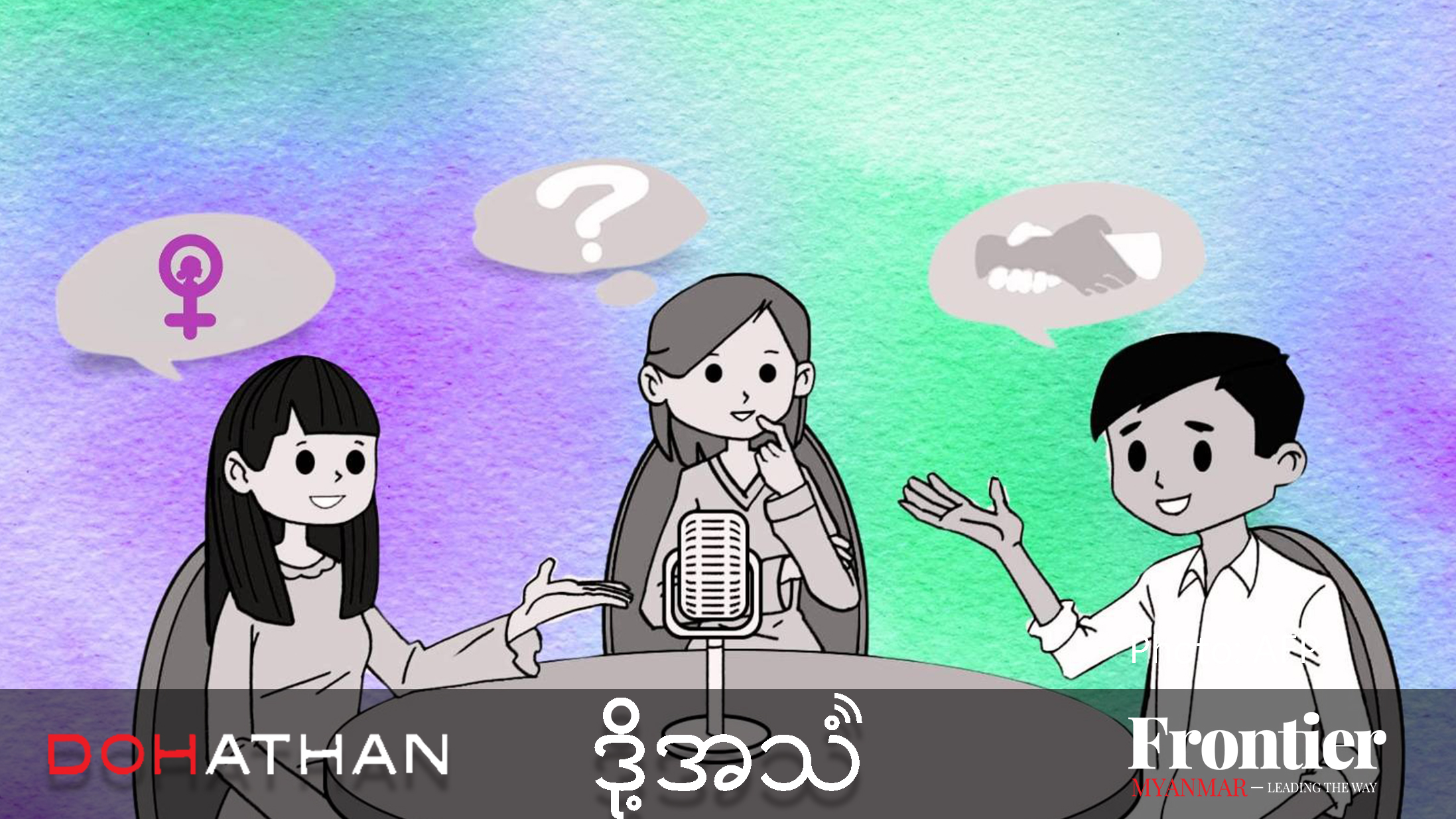Doh Athan takes a hands-on approach this week as reporter Zar Ni joins a self-defence class aimed at helping protect women against the widespread scourge of sexual harassment and abuse in Myanmar. We also hear the thoughts of Myanmar pop icon Ah Moon as she urges women to have the confidence to stand up against abuse. Listen on Soundcloud and YouTube below:
Episode 6 script
Win Zar Ni Aung: Mingalabar, welcome to Doh Athan, a new weekly podcast from Frontier Myanmar, I’m Zar Ni.
Our pioneering audio programme, the first of its kind in Myanmar, helps shine a spotlight on the many human rights issues affecting people across this beautiful country.
Support more independent journalism like this. Sign up to be a Frontier member.
Two weeks ago we reported on the widespread scourge of sexual harassment in Myanmar.
This week Doh Athan takes a ‘hands-on’ approach as we look at what efforts are being done to help protect women against this problem.
A flurry of clenched fists thud into soft leather pads as the chant of numbers echo around the mirror-filled room.
Faces grimace with effort while others focus on the task at hand. Many are smiling and laughing.
It is a scene familiar to fitness classes in gyms across the country. But this is a fitness class with a serious message.
Welcome to the Myanmar’s Women’s Self Defence Centre.
Set up almost two years ago, the class is aimed at helping women protect themselves from one of Myanmar’s biggest problems – sexual harassment and violence against women.
Its founder and self-defence trainer, Michelle, said that she wanted to set up the centre to help women who have suffered from sexual harassment and abuse.
Michelle: I often faced sexual harassment. Later, I was thinking how to solve this problem by practicing aerobics and Taekwondo. But later I started to practice boxing at the YMCA. Now, I feel confident.
We founded this training class to raise awareness of sexual harassment and to give self-confidence to women. We taught how they should respond when they encounter sexual harassment. People should attend not only this class but also another training to protect thereselves.
Win Zar Ni Aung: Apart from sexual harassment in public, other forms of gender-based abuse include economic, emotional and physical violence, which often occurs in homes.
About 35 percent of the world’s women experience sexual violence from either their partners or strangers during their lives, various studies show. A study by the World Health Organization shows that about 30 percent of women in relationships report having experienced physical or sexual violence by an intimate partner.
In Myanmar, data scarcity on the issue remains a challenge. A country-wide report by the Myanmar National Committee for Women’s Affairs said that between four percent and 21 percent of women reported experiencing mental violence while between three percent and 15 percent reported physical violence. Such varying figures show that little research has been done on the issue and real numbers are likely to be much higher due to underreporting.
Almost all of the women who attend the monthly class have suffered some kind of sexual harassment. Many believe they should retaliate.
Su May, 20, who wants to be a self defence trainer herself, started taking lessons after she was left terrified of travelling on buses because of sexual harassment.
Su May: I attend this class because I faced sexual harassment. In the last two years, while I was taking the bus, men were touching my waist. After I faced this experience, I was thinking why I was facing this experience every night. I was so scared. I didn’t to take a bus because I am afraid to meet those men again.
Win Zar Ni Aung: Ei Ngal started attending the classes because she didn’t know how to react after suffering sexual harassment.
Ei Ngal: In our era, I don’t know how to response as far as to complain. My mother told me not to complain because I will be ashamed if I complain. I didn’t know the law. Later, I knew it would need evidence to complain from women’s organisations, and what kind of law we had to complain with.
I am not girlish but I have a kind heart. I act with goodwill and a kind heart for all people. I don’t want women to be weaker physically and mentally. When something happens the majority want to blame women. So, if they try to sympathise with each other this problem will be reduced.
Win Zar Ni Aung: Self-defence trainer Evelyn Yu Yu Swe, 24 , who helped set up the centre, explains some of what is involved in the lessons.
Evelyn Yu Yu Swe: We taught women how to protect themselves when faced with sexual harassment. We don’t teach to fight with men because we are not same strength. We teach every Sunday for a 12 hour course: nine hours are for self defence, one and half hours is an introduction to sexuality and another one and half hours is on laws for women.
Win Zar Ni Aung: Famous Myanmar singer and songwriter Ah Moon told Doh Athan how she once helped her friend go to the police to report sexual harassment.
And she urged women to have the confidence to stand up against abuse from men.
Ah Moon: When my sister met this problem, I took her to the police station directly. I explained to the police myself. Most of the girls don’t want to go to the police station because they must give their NRC Number to the police when they go there. They don’t want to pay because they will lose dignity if there their record is in the police station. I argue that you shouldn’t be afraid to go to the police station because the police have a responsibility to help.
Be confident. People think women are weaker. Don’t be shy to ask other people if you need help.
Win Zar Ni Aung: Now we will round up some of the human rights stories across Myanmar.
Ms Mok Choy Lin of Malaysia, Mr Lau Hon Meng from Singapore, local journalist Ko Aung Naing Soe and driver U Hla Tin were arrested in Naypyitaw on October 26 while on assignment for Turkish state broadcaster TRT for flying a drone near the Union parliament building in Nay Pyi Taw.
After the first hearing, all four defendants have already been handed a summary sentence of two months behind bars under the 1934 Aircraft Act.
Staying behind bars at Ye Mae Thin Prison, they have appeared in court for a second time and are currently facing charges under the Export and Import Law for operating the drone, which carries a maximum sentence of three years’ imprisonment.
Speaking to reporters outside the court, defence lawyer U Khin Maung Zaw said he would submit a letter to authorities calling for the case to be closed ahead of the next hearing on November 20.The defendants had pleaded guilty because they expected to be fined and were shocked when they received jail sentences, Khin Maung Zaw said.
The EU’s foreign policy chief Federica Mogherini on Monday hailed “extremely encouraging” talks with Aung San Suu Kyi on the Rohingya crisis, welcoming steps towards the repatriation of Muslims driven from Myanmar into Bangladesh.
“I found the talks extremely encouraging, I am very much encouraged by the possibility — that I believe is real and concrete — of Myanmar and Bangladesh reaching an agreement for the repatriation of refugees,” she said.
The two countries have yet to strike a binding deal on repatriation. In response the country has said it is ready and willing to take back refugees, if they can “verify” they belong in Rakhine.
Mogherini, who visited refugee camps in Bangladesh’s Cox’s Bazar over the weekend, emerged from Monday’s talks with Aung San Suu Kyi in a positive mood. Although diplomatic pressure has been growing on Myanmar, rights groups say a speedy and safe repatriation of significant numbers of Rohingya is highly unlikely since large numbers are still fleeing violence, fear and hunger on a daily basis, according to AFP.
Tensions over land rights in Myanmar are mounting following the death of an activist who was beaten while visiting a disputed territory at the invitation of local officials.
Htay Aung was attacked by a mob of more than 20 people in northern Shan State. He died of his injuries on 1 November. A police investigation is ongoing.
Disputes over land have increased significantly since political and economic restrictions were eased after 2011, which led to a rush of foreign investments and greater demand for land for industrial use. Government officials say these projects, including mining, hydropower and large-scale agriculture, are essential for development.
In 2012, Myanmar introduced new laws that permitted farmers to obtain land-use certificates aimed at according them greater security. Four years later, the country adopted a national land-use policy and introduced dispute resolution mechanisms.
But land deals are often marred by a lack of consultation, inadequate compensation, the absence of a resettlement policy and a lack of judicial remedies.
Arrests and prosecution of protesters and land activists have risen.
We hope you enjoyed this edition of Doh Athan which was put together this week by Zar Ni and A Htet.
The project to support human rights reporting is a partnership between Frontier Myanmar and Fondation Hirondelle, funded by the Embassy of the Netherlands in Myanmar.
What better way to finish this week’s programme with a song by Phyu Thi which encourages women to take up self defence.







